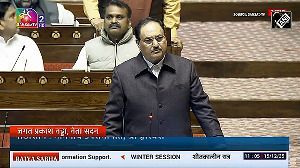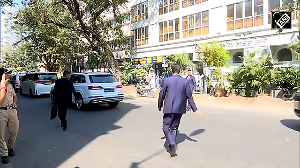The differences in approaches of India and Pakistan were evident as the South Asian Association for Regional Cooperation countries expressed concern over the regional-block not having achieved its full potential and called for greater economic co-operation for poverty alleviation.
More Saarc trade to nurture peace
The landmark 12th summit of the association opened with a call from Pakistan to overcome political differences to attain economic growth in the south Asian region.
Pakistan Prime Minister Zafarullah Khan Jamali emphasised in his inaugural address that political disputes needed to be addressed "in a just and realistic manner," failing which ideas like a common economic and monetary union would remain a distant dream.
Taking a different line, Prime Minister Atal Bihari Vajpayee said the development of greater economic stakes would "naturally result in greater sensitivity to the concerns of each other".
This would pave the way for "the more ambitious, but entirely achievable" goals such as free trade area, an economic union and open borders and a common currency for the region, Vajpayee added.
Bhutanese Premier Lyonpo Jigmi Y Thinley said Saarc had reached a plateau as "problems and intended solutions come to us with a sense of 'deja vu'.
He described economic cooperation as the core basis of Saarc and hoped the work on various components of the proposed free trade area would be completed at the earliest possible".
Describing Saarc as the region inhabited by one-fifth of mankind, Thinley called for understanding the nature and root causes of poverty to alleviate the menace.
Jamali proposed the setting up of a south Asian development bank for the economic progress of the region and also promised full cooperation of Pakistan for the creation of a south Asian energy rim with hydro and gas pipelines.
The Pakistan prime minister acknowledged that the potential of the regional block was "nowhere near realisation".
Vajpayee proposed the creation of a poverty alleviation fund and offered $100 million as initial contribution for poverty alleviation programmes and projects outside India.
Outgoing Saarc Chairman and Nepalese Prime Minister Surya Bahadur Thapa described South Asian Free Trade area as "a big leap in the annals of regional economic cooperation". He said joint efforts should be made to alleviate poverty and stressed the need for the adoption of gender-responsive policies.
Maldives President Maumoon Abdul Gayoom voiced concern over the low volume of intra- regional trade among the countries of the region and said efforts should be made to move towards a south Asian economic union. He pointed out that trade should "not only be free, but equitable also".
During the inaugural session, Saarc leaders signed a landmark ten-point social charter to promote the welfare of people of south Asia and accelerate economic growth, while agreeing to adopt a strategy to deal with key issues like poverty alleviation, promoting the status of women and population stabilisation.
Under the ten-page charter, the seven-member group pledged to establish a people-centred framework for social development and to respond to the immediate needs of those who are most distressed. They agreed to give highest priority to alleviation of poverty in all south Asian countries and take appropriate measures to create income-generating activities for the poor.
Earlier, addressing the summit, Sri Lankan President Chandrika Kumaratunga stressed the need for increased regional cooperation and warned the member nations that globalisation could lead to their marginalisation in the world economic arena.
In this context, she pointed out that intra-Saarc trade constituted about five per cent of the total trade of the seven nations as compared to 35 per cent saarc nations had with asean nations and lamented that the tremendous potential of the Saarc nations was "nowhere near realisation".



